Internet's Card-less Installment Makes Students in Debt|網路"無卡分期"借貸 學生族落背債陷阱

發布時間:
更新時間:
The internet and cell phone APPs encourage students under 20 years old to use their student IDs and card-less installment plan for shopping. However, the Consumer Protection Agency of Taiwan warns this is considered "loan for consumption", but the internet platform has not disclosed information regarding the loan company and interest rates, making the students fall into debt without knowing.
Xiao-wen, who is currently a sophomore, registered for an online class in order to improve his English. After entering his personal information, the sales informed him that he could do installment plan. He got the payment notice of NT$ 90,000 dollars and has paid his first installment. However Xiao-Wen felt the class wasn't fit for him after the first class, and the price was high, so he wanted to cancel the subscription but had to pay a high penalty fee.
I received a booklet. I ripped off the payment page and paid at the convenience store. This completes the transaction. This is a type of installment plan. But I have no idea this installment pay is credit loans or card-less transaction.
The Consumer Protection Association of Taiwan (CPAT) further investigated the complaint and found "card-less installment plan" is popular on the internet and on cell phone APPs. This type of consumption method allows consumers purchase goods and items by installment plan but neglects to disclose it as a "loan for consumption". The victims are largely students under 20.
The operator needs to obtain consent from the legal representative for those who are under 20. You can't say on the website that your parents or your legal representative has viewed the content and has agreed to the contract. We deem this as an invalid agreement.
The CPAT says this type of "loan for consumption" has spread from online schooling to other consumer goods. The card-less installment plan has trapped the students into having a debt. The current law-making process is slow in catching up with the new types of consumption patterns. The CPAT is urging the Financial Supervisory Committee, the Consumer Protection Committee of the Executive Yuan and the Ministry of Economic Affairs to speed up the legislation process. Also the operators and the internet platform need to disclose information on the loan companies and how the interest is calculated.
就讀大二的小文想增進英文能力,選擇網路線上課程,填寫資料後,業務員告知可分期付款,隨後收到將近9萬元的分期繳款單,但付了首期,上完第一堂課,小文感覺課程不合適、價格也不划算,想解約卻得付高額違約金。
大學生 小文表示:「會收到一本紙本, 撕下一頁之後去超商作繳費,這樣就算是繳費完成,也算是另類的分期付款,可是我不知道這個分期付款,就是所謂的信用貸款這種東西,什麼無卡消費這種東西。」
接獲投訴的台灣消保協會進一步追蹤,發現大打「無卡分期」的消費方式,在網路和手機APP上盛行,讓民眾不用提供信用卡,就能分期消費,卻完全未揭露這是消費借貸,尤其未滿20歲學生族群,是最大宗受害者。
台灣消保協會秘書長兼律師 陳意青表示:「未滿20歲的, 業者這部分一定要取得法令代理人的同意,而不是說在網站上面,說你的父母,你的法定代理人,看過這個網頁,等同他也認同所有契約內容,我們認為這樣的約定是無效的。」
台灣消保協會表示,消費借貸已從線上補習類,普及到其它商品消費,利用「無卡分期」陷阱,讓學生群族背上負債,而現有的法令訂定速度又趕不上新型消費型態,呼籲金管會、行政院消保會和經濟部加緊修法,業者和網路平台充分揭露借貸公司、利息計算方式等訊息。









